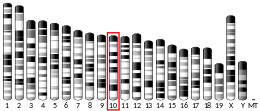HACE1
HECT domain and ankyrin repeat containing E3 ubiquitin protein ligase 1 is a protein that in humans is encoded by the HACE1 gene. [4]
Function
This gene encodes a HECT domain and ankyrin repeat-containing ubiquitin ligase. The encoded protein is involved in specific tagging of target proteins, leading to their subcellular localization or proteasomal degradation. The protein is a potential tumor suppressor and is involved in the pathophysiology of several tumors, including Wilm's tumor. [provided by RefSeq, Mar 2016].
gollark: Change your name to some has'kell.
gollark: It's not a central government applying the tax. It's a syndicate of puppy-kicking organizations backed by military power.
gollark: Example: anarcho-capitalism but with a 10% tax used to fund puppy-kicking organizations.
gollark: I can imagine a more evil one easily.
gollark: That is so loosely defined.
References
- GRCm38: Ensembl release 89: ENSMUSG00000038822 - Ensembl, May 2017
- "Human PubMed Reference:". National Center for Biotechnology Information, U.S. National Library of Medicine.
- "Mouse PubMed Reference:". National Center for Biotechnology Information, U.S. National Library of Medicine.
- "Entrez Gene: HECT domain and ankyrin repeat containing E3 ubiquitin protein ligase 1". Retrieved 2018-07-11.
Further reading
- Anglesio MS, Evdokimova V, Melnyk N, Zhang L, Fernandez CV, Grundy PE, Leach S, Marra MA, Brooks-Wilson AR, Penninger J, Sorensen PH (September 2004). "Differential expression of a novel ankyrin containing E3 ubiquitin-protein ligase, Hace1, in sporadic Wilms' tumor versus normal kidney". Hum. Mol. Genet. 13 (18): 2061–74. doi:10.1093/hmg/ddh215. PMID 15254018.
- Zhang L, Anglesio MS, O'Sullivan M, Zhang F, Yang G, Sarao R, Mai PN, Cronin S, Hara H, Melnyk N, Li L, Wada T, Liu PP, Farrar J, Arceci RJ, Sorensen PH, Penninger JM (September 2007). "The E3 ligase HACE1 is a critical chromosome 6q21 tumor suppressor involved in multiple cancers". Nat. Med. 13 (9): 1060–9. doi:10.1038/nm1621. PMID 17694067.
- Hibi K, Sakata M, Sakuraba K, Shirahata A, Goto T, Mizukami H, Saito M, Ishibashi K, Kigawa G, Nemoto H, Sanada Y (2008). "Aberrant methylation of the HACE1 gene is frequently detected in advanced colorectal cancer". Anticancer Res. 28 (3A): 1581–4. PMID 18630515.
- Sakata M, Kitamura YH, Sakuraba K, Goto T, Mizukami H, Saito M, Ishibashi K, Kigawa G, Nemoto H, Sanada Y, Hibi K (June 2009). "Methylation of HACE1 in gastric carcinoma". Anticancer Res. 29 (6): 2231–3. PMID 19528486.
- Huang Y, de Reyniès A, de Leval L, Ghazi B, Martin-Garcia N, Travert M, Bosq J, Brière J, Petit B, Thomas E, Coppo P, Marafioti T, Emile JF, Delfau-Larue MH, Schmitt C, Gaulard P (February 2010). "Gene expression profiling identifies emerging oncogenic pathways operating in extranodal NK/T-cell lymphoma, nasal type". Blood. 115 (6): 1226–37. doi:10.1182/blood-2009-05-221275. PMC 2826234. PMID 19965620.
- Zhao J, Li M, Bradfield JP, Zhang H, Mentch FD, Wang K, Sleiman PM, Kim CE, Glessner JT, Hou C, Keating BJ, Thomas KA, Garris ML, Deliard S, Frackelton EC, Otieno FG, Chiavacci RM, Berkowitz RI, Hakonarson H, Grant SF (June 2010). "The role of height-associated loci identified in genome wide association studies in the determination of pediatric stature". BMC Med. Genet. 11: 96. doi:10.1186/1471-2350-11-96. PMC 2894790. PMID 20546612.
- Einarsdottir E, Bevova MR, Zhernakova A, Monsuur A, Koskinen LL, van't Slot R, Mulder C, Mearin ML, Korponay-Szabo IR, Kaukinen K, Kurppa K, Kere J, Mäki M, Wijmenga C, Saavalainen P (June 2011). "Multiple independent variants in 6q21-22 associated with susceptibility to celiac disease in the Dutch, Finnish and Hungarian populations". Eur. J. Hum. Genet. 19 (6): 682–6. doi:10.1038/ejhg.2011.2. PMC 3110053. PMID 21326284.
- Torrino S, Visvikis O, Doye A, Boyer L, Stefani C, Munro P, Bertoglio J, Gacon G, Mettouchi A, Lemichez E (November 2011). "The E3 ubiquitin-ligase HACE1 catalyzes the ubiquitylation of active Rac1". Dev. Cell. 21 (5): 959–65. doi:10.1016/j.devcel.2011.08.015. PMID 22036506.
- Castillo-Lluva S, Tan CT, Daugaard M, Sorensen PH, Malliri A (March 2013). "The tumour suppressor HACE1 controls cell migration by regulating Rac1 degradation". Oncogene. 32 (13): 1735–42. doi:10.1038/onc.2012.189. PMID 22614015.
This article incorporates text from the United States National Library of Medicine, which is in the public domain.
This article is issued from Wikipedia. The text is licensed under Creative Commons - Attribution - Sharealike. Additional terms may apply for the media files.

